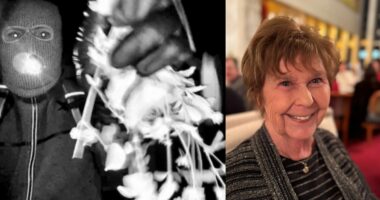Share this @internewscast.com
Left inset: DOJ”s Ed Martin (@USAEdMartin/X). Main: Attorney General Letitia James talks to members of the press outside Brooklyn Hanson Place Seventh-day Adventist Church on Nov. 1, 2025, in Fort Greene, Brooklyn, three days before Election Day (Katie Godowski/MediaPunch/IPX).
New York Attorney General Letitia James has urged a federal judge to provide her with potentially pivotal evidence should he decide not to dismiss what she describes as an “outrageous” bank fraud case linked to a concerted effort by the Trump administration. James argues that the case, rooted in a three-part strategy to indict her, is based on questionable prosecution origins.
Within a detailed 17-page motion to dismiss, citing “outrageous government conduct,” James builds on a separate claim of selective and vindictive prosecution. She accuses key figures—Federal Housing Finance Agency Director William Pulte, DOJ official Ed Martin, and interim U.S. Attorney Lindsey Halligan—of collaborating to transform a flimsy theory into a federal case aimed at punishing a political opponent of former President Donald Trump and demonstrating their allegiance to him.
Addressing U.S. District Judge Jamar Walker, James insisted that if the case isn’t dismissed due to “unprecedented, extensive, and outrageous misconduct,” he should at least demand the discovery of “all communications among and between President Trump, AG Bondi, Ms. Halligan, Mr. Martin, Director Pulte, and their staffs regarding AG James.”
She particularly targeted Pulte, suggesting that the “three most likely scenarios” underpinning the DOJ’s criminal mortgage fraud referral would each constitute “outrageous government conduct.”
James’ filing questions the origin of the referral’s exhibits, noting that while the FHFA doesn’t store individual mortgage documents, Fannie Mae does. Many exhibits cited in the referral were sourced from a single origin—the blog of right-wing “investigator” Sam Antar, who claims to have provided Pulte with the necessary information for the referral. Consequently, in creating the criminal referral letter and its exhibits, Director Pulte either (1) relied solely on Antar’s fringe evidence, (2) independently procured these documents from various county offices, or (3) unlawfully accessed AG James’s loan files via Fannie Mae’s database.
The filing further describes Martin’s alleged antics, including being spotted in a “Inspector Gadget-inspired beige trenchcoat” in August, accompanied by media, outside James’ Brooklyn residence. Martin is accused of pressuring James to resign under threat of prosecution, which the filing suggests was an attempt to expose the true motive behind the investigation.
“On August 12, 2025, while a pending investigation was underway that Mr. Martin was supposed to be leading, he sent AG James’s counsel a letter insisting that she ‘resign from office’ because, in his view, it ‘would best serve the ‘good of the state and nation” and ‘give the people of New York and America more peace than proceeding,’” court documents said. “Mr. Martin also stated that ‘[he] would take this as an act of good faith’ if she were to resign from office.”
Claiming that Martin ran roughshod over the Professional Rules of Responsibility, particularly Rule 3.8’s “special responsibilities of a prosecutor,” James’ motion alleged that Martin did not attempt to “be objective in seeking the facts and applying the correct law,” but instead “orchestrated a bizarre media stunt” complete with “strange antics” by showing up with a New York Post photographer in the AG’s neighborhood.
“The Post, with a photographer in tow, was there to capture the moment for Mr. Martin, adorned in an Inspector Gadget-inspired beige trenchcoat, in the middle of an August summer day. And in what could only reasonably be construed as an attempt to intimidate AG James, a few days later, Mr. Martin posted a photo of himself in front of her home on his official DOJ X account,” the filing said. “It is clear Mr. Martin—a high-ranking official in the United States Department of Justice—undertook these strange antics to intimidate and prejudice AG James outside the bounds of DOJ and relevant ethics rules.”
“There is no conceivable legitimate reason for Mr. Martin to stalk AG James’s home,” the filing continued, slamming Martin’s remark to James’ neighbors that he was “just happy to be on a block looking at houses … just looking at houses, interesting houses.”
Turning next to Halligan — “Whose Only Credential is Loyalty,” a subheading said — James claimed Pulte and Martin boosted their profiles in the Oval Office and online after the rookie prosecutor convinced a grand jury to indict in a case, whose “legal viability” reportedly didn’t satisfy former interim U.S. Attorney for the Eastern District of Virginia Erik Siebert or Deputy Attorney General Todd Blanche, Trump’s former defense attorney turned No. 2 official at the DOJ.
“Ms. Halligan alone went before a grand jury in Alexandria, Virginia—not in Norfolk, where grand jurors had heard evidence and witnesses for months—and left with a two-count indictment against AG James bearing the exact calculations Director Pulte had sent to Ms. Halligan just a few days prior. ‘Minutes after James was indicted, Pulte came into the Oval Office to boast that he and Halligan had pulled it off on their own,’ according to the Wall Street Journal,” the filing added. “That evening, Mr. Martin posted on X, ‘Promises made, Promises kept.’”
Repeating the argument that Halligan was unlawfully appointed for the purpose of indicting Trump’s “political enemies,” James cited case law noting that the kind of “outrageous government conduct” that typically gets an indictment dismissed involves “pure brutality” that “shocks the conscience,” like “torture” or criminal activity. The AG acknowledged that the alleged circumstances here amount to an “issue of first impression” — that is, uncharted territory.
“Whether the government’s willingness to abuse its power and break its own rules and systems to obtain this indictment can sufficiently ‘shock the conscience’ to require dismissal of an indictment is an issue of first impression,” the filing concluded. “As the facts illustrate, Director Pulte, Mr. Martin, AG Bondi, and Ms. Halligan do not believe themselves bound by the Constitution, federal statutes, or fundamental ethical norms.”
















